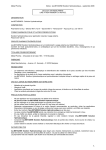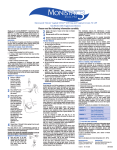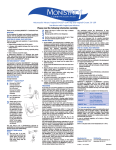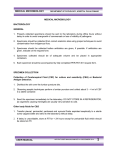Download IMPORTANT INFORMATION FOR USERS 1
Transcript
Pregnancy Rates for Birth Control Methods (For One Year of Use) 1. In clinical studies with Today® Sponge, the pregnancy rates per 100 women during the first year of use were: About 1 out of 10 women (9-11%) became pregnant when using this correctly all the time. The possibility of getting pregnant increased to about 1 out of 7 women (13-16%) when this product was not used correctly. VAGINAL 5. The following table gives the approximate number of women out of 100 women who are likely to become pregnant while using a particular contraceptive method for one year. 2. 3. Pregnancy Rates for Birth Control Methods Number of Women Out of 100 Women Who Will Become Pregnant in the First Year of Use 4. Table A Vaginal Contraceptive Sponge This 24-hour vaginal contraceptive sponge is intended for the prevention of pregnancy. Most Effective (Fewer Pregnancies) Method Consumer Information Leaflet Your Personal Guide Please read the Drug Facts label on the carton and this leaflet completely and carefully before using Today® Sponge. If used correctly according to the label and diagram instructions on back of leaflet, Today® Sponge may be a safe, effective and convenient birth control method. Sterilization (male or female) Intrauterine Devices (IUDs) Less than 1 Hormonal Methods: Implant Less than 1 • You were told that you should not become pregnant • You have given birth before No birth control product can prevent pregnancy all the time. See Table of Pregnancy Rates for Birth Control Methods for a comparison of pregnancy rates. No birth control method is without side effects or is suitable for all women. Consult a health professional for your best method. For best results, barrier methods, such as the sponge or condom, must be used correctly during every act of intercourse. Least Effective (More Pregnancies) 5. Sponge exterior is carefully shaped for easy insertion. 8 Male condoms (used without spermicide) 15 No birth control method can provide reliable protection if it is not used correctly and consistently. Lea’s Shield (used with spermicide) Diaphragm (used with spermicide) 152 Vaginal Sponge (contains spermicide)2 Cervical Cap (use with spermicide) 16 for women who have never had children 32 for women who have had one or more children Female Condom Withdrawal Natural Family Planning (calendar, temperature, cervical mucus) 16 16-32 For greater birth control protection, you may want to use another method of birth control in addition to using the sponge, especially during the first few months while you become familiar with how to use it. Correct use of a latex condom by your partner together with your correct use of the Today® Sponge may provide additional protection against getting pregnant. C. How easy is it to use Today Vaginal Contraceptive Sponge? 21 25 - 27 Spermicides alone (gel, cream, foam, film, suppository) 29 No contraception 85 1 “Typical Use” means use that is less than perfect. Sometimes women do not use a method correctly or with every sexual act of intercourse. 2 4. Anatomically contoured indentation covers cervix to help position sponge properly. Pill Patch Vaginal Ring 3. Specially designed ribbon loop is attached to an interior web for maximum strength for removing sponge. 6. Store Today® Sponge at 20-25°C (68-77°F). B. How can I improve the effectiveness of the Today Vaginal Contraceptive Sponge? If you have no previous experience with vaginal birth control products, you should contact a doctor, health professional or family planning clinic for advice on how to use this product correctly. If you have any questions on the best birth control method for you, contact a doctor, health professional or a family health clinic, especially if: 2. Soft polyurethane foam sponge is formulated to feel like normal vaginal tissue. 3 1. Nonoxynol 9 contained within the sponge is released gradually over a 24-hour period. Injection IMPORTANT INFORMATION FOR USERS Number of women out of 100 who will become pregnant in one year of typical use1 This product is designed to be convenient and easy to use, and to avoid interruption of lovemaking, because it can be inserted up to 24 hours before starting intercourse. Protection begins right away and lasts for 24 hours even with repeated acts of intercourse. However the sponge should remain in place for at least 6 hours after the last act of intercourse, but should not be left in the vagina longer than 30 hours. Any woman who can use a tampon should not have difficulty using the sponge. It does not require a special fitting or prescription. Clinical trial product data submitted to FDA Data adapted from: Trussell J. Contraceptive Efficacy. In Hatcher RA, Trussell J, Stewart F, et al. Contraceptive Technology: Nineteenth Revised Edition. New York, NY: Ardent Media, 2007. 1. PRODUCT OVERVIEW A. What is Today Vaginal Contraceptive Sponge and how does it work? This birth control product is a soft, disposable polyurethane foam sponge containing 1000 mg of nonoxynol 9, which kills sperm on contact. It is inserted into the vagina and while in place provides protection against pregnancy for 24 hours. As long as the sponge is in place in the vagina, there is no need to add additional spermicidal creams or jellies, even if intercourse is repeated. Used as directed, Today® Sponge prevents pregnancy in three ways: 1) the nonoxynol 9 contained in Today® Sponge kills sperm before they can reach the egg; 2) Today® Sponge blocks the cervix opening to the uterus so the sperm cannot enter; 3) Today® Sponge traps and absorbs the sperm. 2. WARNINGS • • For vaginal use only Not for rectal (anal) use Toxic Shock Syndrome: Some cases of Toxic Shock Syndrome (TSS) have been reported in women using barrier contraceptives, including the sponge. TSS is a rare, but serious disease that may cause death. Warning signs of TSS include fever, nausea, vomiting, diarrhea, muscle pain, dizziness, faintness or a sunburn-like rash on face or body. If you have any of these signs, remove the sponge and get medical help right away. You can avoid the risk of getting sponge-associated TSS by not using the sponge Sexually transmitted diseases (STDs) alert: This product does not protect against HIV/AIDS or other STDs and may increase the risk of getting HIV from an infected partner Do not use • within the first six weeks after giving birth • if you have ever had Toxic Shock Syndrome • during your menstrual period if you or your sex partner has HIV/AIDS. If you do not know if you or your sex partner is infected, choose another form of birth control • if you are allergic to sulfites. This product contains sodium metabisulfite which may cause severe allergic reactions in some people • if you have ever had an allergic reaction to nonoxynol 9 or to this product Ask a doctor before use if you have • recently had a miscarriage or an abortion • been told that you should not become pregnant • a vaginal or uterine condition, such as a vaginal septum or uterine prolapse, which may keep the product from working • signs of pregnancy such as a late menstrual period • a new partner, multiple sex partners, or unprotected sex. Frequent use (more than once a day) of this product can increase vaginal irritation, which may increase the risk of getting the HIV/AIDS virus or other STDs from infected partners. Ask a doctor or health professional for your best birth control method • When using this product • you may get vaginal irritation (burning, itching, or a rash) Stop use and ask a doctor if • you or your partner get burning, itching, a rash, or other irritation of the vagina or penis • you or your partner have difficult or painful urination • you get abdominal pain, fever, chills, or a foul-smelling vaginal discharge • you become pregnant Keep out of reach of children. If swallowed, get medical help or contact a Poison Control Center right away. (For most people, ingestion of small quantities of spermicide alone should not be harmful.) • you can use nonoxynol 9 for birth control with or without a condom if you have sex with only one partner who is not infected with HIV and who has no other sexual partners or HIV risk factors • when used correctly every time you have sex, latex condoms greatly reduce, but do not eliminate, the risk of catching or spreading HIV, the virus that causes AIDS, and other STDs from infected partners • use a latex condom without nonoxynol 9 if you or your sex partner has HIV/AIDS, multiple sex partners, or other HIV risk factors • ask a health professional if you have questions about your best birth control and STD prevention methods • store at 20-25°C (68-77°F) 6. OTHER QUESTIONS YOU MAY HAVE A. How can I reduce the chances of a serious infection including sexually transmitted diseases (STDs)? • Read Warnings and Other Information sections before use. • You may want to see a doctor or health professional for advice on how to reduce the risk of STDs, especially if you have a new sex partner or multiple sex partners. • Correct use of a latex condom by your partner with every sexual act will help reduce the risk of transmission of the human immunodeficiency virus (HIV) and acquired immunodeficiency syndrome (AIDS) and many sexually transmitted diseases (STDs). • Do not leave the sponge in vagina longer than 30 hours. • Make sure that all of sponge is removed from vagina. • Wash hands before inserting and removing the sponge. B. Can I use Today® Sponge during my menstrual period? 3. DIRECTIONS • Today® Sponge should not be used during the menstrual period. Some cases of Toxic Shock Syndrome have been reported in women using the sponge during their menstrual period. Before using, read the back of this leaflet for diagram instructions for inserting and removing sponge. C. Can I have an allergic reaction or other side effects from the Today® Sponge? • Wash hands before use. • Remove the sponge from the pouch. • Wet the sponge thoroughly with clean water, squeeze gently several times until sponge is very sudsy. • With the dimple side of the sponge facing up, fold sponge upward and insert the sponge deep into the vagina as shown in diagram (see section 9). The ribbon loop must be on the bottom for easy removal. • Protection begins right away and lasts for 24 hours even with repeated acts of intercourse. • Wait at least 6 hours after the last intercourse before removing sponge. • Do not leave sponge in vagina for longer than 30 hours. Leaving the sponge in vagina longer than 30 hours may increase the chances for vaginal irritation and serious infections. • Do not re-use the sponge • If you have trouble removing the sponge from your vagina or remove only part of the sponge, call the Mayer Labs Product Support Line at 1-877-494-2525 or contact a health professional right away. • Do not douche while sponge is in your vagina. • If you have ever had a severe allergic reaction to sulfites, do not use this product because it contains sodium metabisulfite. • A small number of men and women may be sensitive to the spermicide, nonoxynol 9, in this product and you should not use this product if irritation occurs and persists. Of the women in clinical trials, between 2-3% discontinued use of the sponge because of itching, irritation, or rash, and 1-3% discontinued because of allergic reactions. Douching is not necessary. If you want to douche wait at least 6 hours after last intercourse and remove the sponge before douching. 4. INACTIVE INGREDIENTS Benzoic acid, citric acid, sodium dihydrogen citrate, sodium metabisulfite, sorbic acid, water in a polyurethane foam sponge. 5. OTHER INFORMATION • studies have raised safety concerns that products containing the spermicide nonoxynol 9 can irritate the vagina and rectum. Sometimes this irritation has no symptoms. This irritation may increase the risk of getting HIV/AIDS from an infected partner separation or “splitting” of sponge material at stress points around the ribbon loop or in the center of the indentation. But these minor separations do not affect the contraceptive capabilities of Today® Sponge in any way. H. What if I have trouble removing Today® Sponge? • If you have trouble removing the sponge or think that parts of the sponge are still in your vagina, carefully follow the removal instructions on the back of this leaflet. If you still have trouble removing the sponge call the Mayer Labs Product Support Line at 1-877-494-2525 or contact a health professional right away. I. Can my partner feel Today® Sponge during intercourse? • Today® Sponge is designed to be soft and comfortable. It feels like normal vaginal tissue. Some men may feel the sponge during intercourse, but this is usually not objectionable. J. Can I leave Today® Sponge in place when I swim or bathe? • Yes. Today® Sponge will not be affected in any way. K. Is Today® Sponge as effective as the pill or IUD? • No. Today® Sponge is not as effective as the pill or IUD. See Table of Pregnancy Rates for Birth Control Methods. L. Can I use Today® Sponge more than once? • No. Use Today® Sponge as directed and dispose of the used sponge in a waste container. Do not flush it down the toilet. Additional questions or comments? Call toll free1-877-494-2525 M-F 8am-5pm PST D. What if Today® Sponge develops an odor? • It is unlikely that you will notice an odor while Today® Sponge is in place. If there is a noticeable odor when you remove the sponge, do not be concerned. Any material placed in the vagina will occasionally produce an odor when exposed to normal vaginal fluids and semen. E. Can I insert Today® Sponge after intercourse? • No, the sponge must be inserted before intercourse begins. Once the penis enters the vagina, there is a greater chance of getting pregnant because there may be the leakage of sperm without ejaculation and, with ejaculation, sperm reaches the fallopian tubes even more quickly. F. How does Today® Sponge stay in place? Can the sponge get lost in my body? VAGINAL • Today® Sponge is held in place by the muscles of the upper vagina. The cup-like indention in the sponge helps to keep it in place directly over the cervix. The opening from the vagina to the uterus is far too small for the sponge to pass through. There is no other normal opening in the vagina that would provide access to any other part of your body. G. Can Today® Sponge tear while it is in place? • Today® Sponge should not tear with normal muscular movement within the vagina or even during intercourse. Be careful not to push a fingernail through the sponge when inserting or removing the sponge. There may be minor Manufactured for: Mayer Laboratories, Inc. 1950 Addison Street, Berkeley, CA 94704, USA www.TodaySponge.com / 1-877-494-2525 Today is a registered trademark of Almatica Pharma, Inc. Made in U.S.A © 2011 Mayer Laboratories, Inc PN55300_V1_06-07-11_pg1.ai PKG00910 7. Important Points to Remember • If you are unsure about how to use Today Vaginal Contraceptive Sponge, contact a doctor, health professional, or family planning clinic for help. • Today® Sponge contains enough spermicide for repeated acts of intercourse during a 24-hour period. • To avoid introducing germs into your vagina, always wash your hands before handling Today® Sponge and before inserting your fingers into your vagina. • It is not necessary to use the sponge for a full 24 hours, as long as it is left in place 6 hours after the last act of intercourse. • Wetting Today® Sponge with clean water is important. This is what activates the spermicide. You will notice light foam or “suds”. Do not try to rinse this out. • You may insert Today Vaginal Contraceptive Sponge any time up to 24 hours before beginning intercourse. After inserting the sponge, you may have intercourse right away. • If you have intercourse when sponge has been in place for 24 hours, leave it in place an additional 6 hours after intercourse before removing it. Today® Sponge must not be left in place for more than 30 hours. • If you have trouble removing the sponge or if you remove only part of the sponge call the Mayer Labs Product Support Line 1-877-494-2525 or contact a health professional right away. side view 3. Squeeze the sponge gently several times until it becomes very sudsy. Be sure you do not squeeze the sponge dry. (The sponge should remain sudsy for insertion.) side view side view Clitoris Labia Urinary Opening Vaginal Opening Anus Urinary Opening D. Bearing Down Uterus Cervix Vaginal Opening Today Vaginal Contraceptive Sponge is inserted through the vaginal opening and placed in the deepest part of the vagina, just below the cervix. The cervix is at the bottom end of the uterus, and has a small opening through which sperm must travel to reach and fertilize the egg. Sit on the edge of a chair with knees apart. Place a good source of light about an arm’s length in front of you and use a hand mirror to examine the region between the outer “lips,” or labia. The vaginal opening is between the labia, just below the small urinary opening and one or two inches below the clitoris. It is easier to find the cervix if you squat. Insert your finger gently into the vagina, reaching up on an angle toward the back until you find the firm, round surface of the cervix. It feels something like the tip of your nose. In some cases, it may be difficult to locate, so you may have to explore a bit before you find it. You can bring your cervix down closer to the vaginal opening, and thus make it easier to locate, by bearing down. Take a deep breath and bear down as if you were having a bowel movement. You should now be able to locate your cervix just above the vaginal opening. This technique is also very useful for removing the sponge. 10. How to remove Today Vaginal Contraceptive Sponge 4. Fold the sides of the sponge upward with a finger along each side to 2. Wet the sponge thoroughly with clean tap water. The water activates the C. How do I find the cervix? front view Ovaries Uterus Cervix Vagina 1. Remove the sponge from the airtight plastic pouch and hold it in one hand with the “dimple” side up. The loop should dangle under the sponge. B. How do I find the vaginal opening? A. To use this method effectively, it is important for you to understand your anatomy. Anus 9. How to insert Today Vaginal Contraceptive Sponge A. Insertion Procedure The sponge may be inserted any time up to 24 hours before intercourse. 8. Some basic information about your reproductive system support it. The sponge should look long and narrow. Be sure the string loop dangles underneath the sponge from one end of the fold to the other, as shown. A. Removal Procedure 1. Always wait 6 hours after your last act of intercourse before removing the sponge. 2. Put your finger into your vagina spermicide. and reach up and back to find the string loop. If you cannot find the loop immediately, bear down until you feel the loop (see “Bearing Down,” section 8D). Hook your finger around the loop. (If you have not found the loop, grasp the sponge between your thumb and forefinger.) 5. Bend your wrist and point the end of the folded sponge toward your vagina. Be sure that you can see the fold when you look down at it and that the string loop dangles below. If none of the above suggestions seems to help, see your physician or family planning clinic. You may wish to take several unused Today® Sponges along so your medical advisor can help you refine your insertion and removal technique. 2. Upside-down Sponge Occasionally, a sponge will turn upside down in the vagina, making the string loop more difficult to find. To find the string loop, run your finger around the edge on the back side of the sponge until you feel the string loop where it’s attached to the sponge. 3. Slowly and gently pull the sponge out. If the vaginal muscles seem to be holding it tightly, wait a few minutes and try again. If removal is still difficult, use the following exercise to relax your vaginal muscles: Tighten vaginal muscles as hard as you can and hold for 10 seconds, then relax and let go. Repeat. As you relax, breathe out slowly while bearing down (see section 8D). Now remove the sponge as you continue to relax. 4. Dispose of the sponge in a waste container. Do not flush it down the toilet. 6. From a standing position, squat down slightly and spread your legs apart. Use your free hand to spread apart the lips of the vagina. You may also stand with one foot on a stool or chair, sit cross-legged or lie down. The semi-squatting position seems to work best for most women. Slide the sponge into the opening of the vagina as far as your fingers will go. Let the sponge slide through your fingers, deeper into the vagina. 7. Now use one or two fingers to push the sponge gently up into your vagina as far as it will go. Be careful not to push a fingernail through the sponge. Check the position of the sponge by sliding your finger around the edge of the sponge to make sure your cervix is not exposed. You should be able to feel the string loop. B. Questions about insertion of Today® Sponge. 1. How do I know Today® Sponge is in the proper position? If you follow the instructions in this booklet, Today® Sponge should be positioned correctly in the upper vagina. To check its position, simply slide your finger around the edge of the sponge. If your cervix is not exposed, the sponge is in the proper position. You should be able to feel the string loop. If the sponge is out of position, simply slide it back in place. 2. Can Today® Sponge fall out? It is unlikely that Today® Sponge will fall out. During a bowel movement or other form of internal straining, it may be pushed down to the opening of the vagina and perhaps fall out. If you suspect this happening, simply insert your finger into your vagina and push it back. If it should fall into the toilet, moisten a new sponge and insert it immediately. Do not flush the old sponge down the toilet. Discard it in a waste container. 3. How does Today® Sponge stay in place? If you cannot find the string loop, simply grasp the edge of the sponge between your thumb and forefinger and pull it out slowly. Bearing down (section 8D) will make it easier to reach the sponge. 3. Torn Sponge Today® Sponge, like a soft contact lens, should be handled gently. Pulling too hard or too quickly on the removal loop may cause the sponge to tear. B. Special Removal Situations 1. Stuck Sponge There are no structures in the vagina to interfere with removal of the sponge. With tension or unusually strong muscular pressure, the sponge may be held in the vagina more tightly than normal. Simple relaxation of the vaginal muscles and bearing down should make it possible to remove the sponge without difficulty (see section 8D). If you are still unable to remove the sponge, it may have adhered by suction to the cervix. To remove, it is necessary to break the suction. To do this, slip a finger between the sponge and the cervix on one side, tilting the sponge up and away from the cervix. Once free, the sponge may be removed normally. The procedure for removing a torn sponge is similar to that for an upside-down sponge. The important thing is to remove the sponge slowly. If you suspect that you have left small pieces of sponge inside the vagina, run a finger around the upper vault of your vagina with a sweeping movement and then toward the vaginal opening to find and remove any remaining sponge material. To reduce the risk of infection, it is important that you get all parts of sponge out of the vagina. If you have difficulty getting parts of sponge out of the vagina, call the Mayer Labs Product Support Line at 1-877-494-2525 or contact a health professional right away. C. Questions about removal of Today® Sponge. ® Today Sponge is held in place by the muscles of the upper vagina. In addition, the cup-like indentation on the top of the sponge helps to keep it in position directly over the cervix. 1. Is it necessary to douche after removing Today® Sponge? 2. Can Today® Sponge get lost in my body? No, it is not necessary. However, you may douche after using the sponge if you like. But do not douche while the sponge is inside the vagina. And always wait at least 6 hours after intercourse before removing the sponge. The opening from the vagina to the uterus is far too small for Today® Sponge to pass through. There is no other normal opening in the vagina that would provide access to any other part of your body. PN55300_V1_06-07-11_pg2.ai PKG00910






















